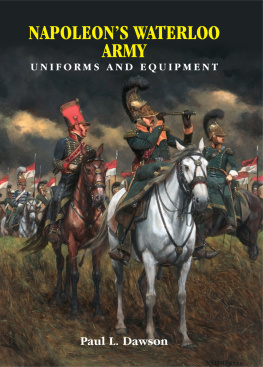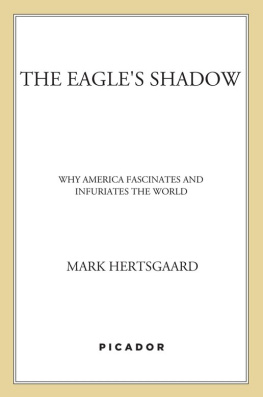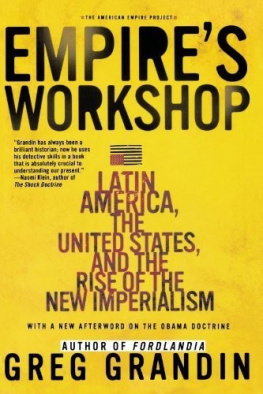CONTENTS
Guide
Thomas E. Crocker is a graduate of Princeton University and Columbia Law School. He is a former U.S. diplomat and for many years was a partner in a large U.S. law firm, where he specialized in international trade issues. He also is the author of Braddocks March (2009), an award-winning history of General Edward Braddocks expedition at the start of the French and Indian War.
THE GENESIS OF THIS BOOK WAS A SERIES OF SHORT BIOGRAPHICAL PROfiles I wrote on residents of Georgetown in Washington, D.C., during the period 18161817. Checking in the newspapers of that period, I chanced on a report of the Philadelphia wedding of Stephen Girards niece attended by the king of Spain, Marshal Grouchy, General Lallemand, and others. Immediately realizing that the guest list was an abbreviated version of Napoleons order of battle for Waterloo, I was surprised to learn that these people were in the United States and suspected that therein lay a story. So my research began.
Shortly thereafter, at the wedding of the daughter of an old friend, Allen Barringer, I fell into a conversation with Napoleonic scholar Rand Mirante, also a long-standing friend. He alerted me to the controversy surrounding Marshal Ney and P. S. Ney. Suddenly, the shape of the book formed in my mind, and I was off to the races, writing even as I researched. It is hard to describe the thrill of holding in ones hands original letters written by Napoleon, Marshal Grouchy, the prince and princess of Moscow, and others from this colorful cast of characters. Only toward the end of the process did I discover that Allen Barringers great grandfather and great-great uncle were students of P. S. Ney in the 1830s (the latter, Judge Victor C. Barringer, thought that P. S. Neys French was weak and that he was not Marshal Ney).
I started the book with no impression one way or the other about Marshal Ney. During the course of my research and writing, I came to respect and even like him as a man of virtue.
I wish to thank Rand Mirante for giving me the inspiration for this book and for reading and critiquing the manuscript in draft form. His comments helped immeasurably. I also wish to thank my agent Roger Williams, especially for stepping in and taking ownership of this project when my long-standing agent Joe Vallely died in an untimely fashion just days after receiving the manuscript. Thanks also to Jonathan Kurtz and Jessica McCleary at Prometheus Books/Rowman & Littlefield, as well as to Vally Sharpe, who more than once rescued me from seemingly intractable formatting issues with the manuscript. I found the staff at the Wilson Library at the University of North Carolina, the Historical Society of Pennsylvania, the Library of Congress, and the National Archives, among others, all to be knowledgeable and helpful.
Finally, I wish to thank my dear wife Beth for accompanying me all over the United States and to France while I conducted my research and for acting as my sounding board (and sanity check) as I constantly tested theories and leads about the Marshal Ney/P. S. Ney mystery. This book is dedicated to her in love and gratitude.
| President | Secretary of State | Minister to Paris |
James Madison (March 4, 1809March 4, 1817) | James Monroe (March 4, 1817March 4, 1825) | Gen. John Armstrong (June 30, 1804September 14, 1810) |
Jonathan Russell, Charg (September 14, 1810July, 1811 (arrival of J. Barlow) |
Joel Barlow (February 27, 1811December 26, 1812) |
William H. Crawford (April 9, 1813April 22, 1815) |
Henry Jackson, Charg (April 22, 1815July 9, 1816) |
James Monroe (April 2, 1811March 3, 1817) | John Quincy Adams(September 22, 1817March 3, 1825) | Albert Gallatin (July 16, 1816May 16, 1823) |
Respected Sir, 1 Oct. 1831
The honour of an introduction to the revered Mr. Madison has not been my happy lot. The subject of this intrusion shall be briefly expressed. Le Sage entend demi mot. And it shall be demi mot. You, respected Sir, already Stand at the head, the very head of American Patriots. You have it in your power to transcend them all! The step is a bold Onebut it requires only one hour of your prolific pen to accomplish your elevation. Neither Tariff, nor Nullification, nor State, nor Federal sovereignty is the object of this demi Mot, but what is infinitely more important than either, to the permanent happiness of this Union and the subjects thereof. In a word, it is the future security of the Whites! Your powerful mind can at once grasp the whole subject. Your wisdom and sage habit of thought can readily devise the means, and point out to the States and General Government acting in concert & mutual compromise for their Common welfare, the mode of dislodging the tremendous incubus, which now sits on their bosom. I mean Negro Slavery! Recent events confirm the long established axiom, That Men submit no longer to slavery & degredation [sic] than circumstances compel them & that hope and desperation will prompt to the most sanguinary and woeful attempts at revenge or vindication enough.
What I propose for your consideration is this. Let the U. S. territory West of the Rocky Mountains be appropriated by Mutual Consent of the States for the colonization of the Sable population of U.S. Let the period for the commencement of gradual emancipation & its equitable details, be fixed by the States and Congress &c. at 183233, 34, or such time as their collective wisdom may deem meet. Let the child Unborn be the subject of emancipation and emigration, after a proper servitude to redeem its raising &c. in such proportions as may be agreed on by the proper authorities. Say every 3d. or 5th. Slave &c per annum.
The African Colonization Society, may, in the mean time, pursue their noble object in view. This drain over the Rocky Mountains will be tenfold, and efficient to keep down the procreation in the States, and its inevitable consequence, if such a plan be not adopted. Enough for you My dear & revered Sir. I have gone over un demi Mot. Permit me merely to suggest one idea more. You I fear will call it selfishBut what are we all but selfish beings! He who leads the in this affair will be immortalized! Yes Sir, immortalized.
Your name is already high on the Roll of fame; but this Scheme recommended by you, in the clear and irrefutable Style of your Pen, will place your name on the Apex of that Pyramid of American glory & humanity produced to last forever.
God grant & that you may comprehend my demi mot, & that your health & inclination may prompt you to fill one sheet for the consideration of those whom it so deeply concerns.
P. S. NEY.
RESOURCES
American Philosophical Society, Philadelphia, PA
Archives Nationales de France, Paris, Fonds du Marchal Ney et de sa Famille (17531923), 137AP
Athenaeum of Philadelphia, Philadelphia, PA
Columbia University Library, New York, NY
Davidson College Library, Davidson, NC
Historical Society of Pennsylvania (HSP), Philadelphia, PA
Library Company of Philadelphia, Philadelphia, PA
Library of Congress (LOC), Washington, DC
Lyman Copeland Draper Manuscripts, 17351890, State Historical Society of Wisconsin (available at the LOC, Manuscript Reading Room, Microfilm 17,881-134P [reels 11315])
Maryland Historical Society (MHS), Baltimore, MD
National Archives and Records Administration (NARA), Washington, DC








